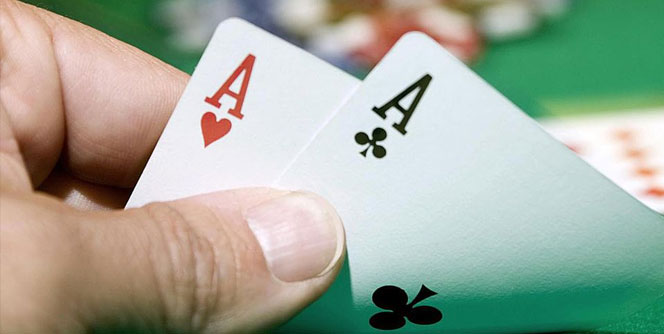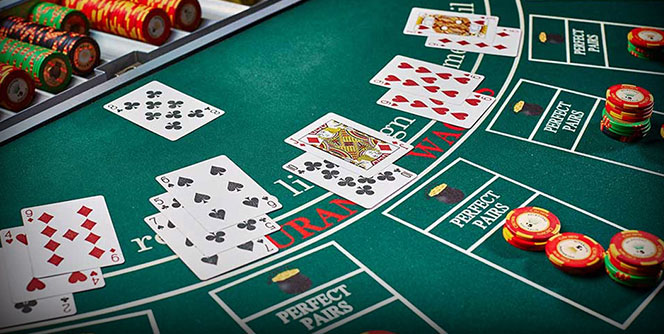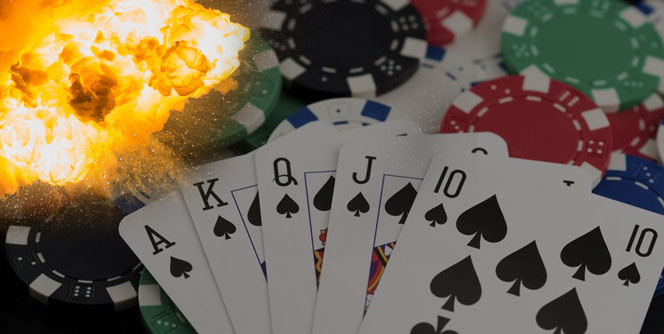Over the last decade or so, poker has become one of the more popular games played around the globe. A simple hobby for some and a serious profession for others (and anything in-between), poker, especially its most popular variation that is Texas Hold’em, is a very special type of game.
The game balances between luck and skill just enough to attract those looking to gamble and have fun but offering great opportunities for those seriously dedicated to learning and improving. You may have heard it many times and it remains the fact that a good player will always beat a bad one over a long period of time.
However, due to the luck factor, which makes the game so popular in first place, poker can be very harsh at times. Even the best players can (and do) go on long losing streaks. In this blog, we’ll focus on these aspects of the game, which seem to evade our control regardless of the skill level. How do you tackle „bad luck“ and is there anything we can do to help when things go south?
The Poker Rollercoaster: Dealing with Variance
In Texas Hold’em, pocket Aces are a huge favorite to win before the flop. Most of the times you get your chips in before the flop, you’ll be an 80% or better favorite to win the hand. However, this also means you’ll lose 20% of the time. In a vacuum, you’d want to be in this scenario over and over again for the rest of your life.
However, every time you get your chips in the middle, the odds are the same, and it doesn’t matter if you had lost three times with your pocket Aces already. You might lose again because cards have no memory. This is, in short, what variance in poker is all about.
Anyone who’s played poker for any significant number of hands will tell you there are periods when no matter what you do or how you play your hand, you just can’t seem to win. I’ve had these periods myself time and time again having played poker online and live for well over a decade. Every time it matters, your hand loses.
Are You Unluckiest Person in the World?
When these periods come, it becomes hard to maintain your composure. Even if you know all there is to know about poker and variance, you start wondering if it will ever end and if you might be the unluckiest person in the world.
You aren’t – and it will end!
Variance in poker is as natural as any other segment of the game. The luck factor is there and it is what attracts inexperienced players. If they get lucky, they can win, even if they don’t know the first thing about the underlying math or strategy. But, for them to get lucky, you have to get unlucky, there isn’t a way around it.
In the long run, things will even out, but the long run is longer than most people can imagine. Math behind the game isn’t some random bunch of numbers. It is based on solid, unchangeable facts, and as long as you’re playing good, the downswing will end eventually.
What You CAN Do
One of the biggest problems with luck or variance, whatever you want to call it, isn’t the fact it exists; it is the way we react to it. In the above scenario with pocket Aces, after losing four times in a row, many people will start playing scared, not wanting to get their chips in the middle, fearing they might lose again.
When you hit a stretch of prolonged bad luck at the tables (and you’ll know when this happens), there are certain things you need to do to make sure you aren’t losing more or more often than you should:
- Don’t change your game based on your “bad luck”
- Don’t try to justify your mistakes by running bad
- Stay patient and analyze your own play as much as possible
If you know you’re making right decisions most of the time, there is no reason to change anything. Let cards fall as they may and wait for the tides to shift. This will happen eventually and, when it does, if you’re playing well, you’ll start winning – even in situations where you aren’t supposed to win.
But, don’t let bad luck get inside your head and start making plays you know are wrong. The mentality of “it doesn’t matter, I’ll lose anyways” is very dangerous, because it will make variance even worse. Now, you aren’t just losing in the pots you’re the favorite to win; you’re also putting yourself in bad spots you have no business being in.
Variance can be tough to deal with but there is no way around it if you want to be a poker player. Know your math, play your game, and don’t worry about short-term results. In the end, the better player always wins.
Reality of Bad Beats in Poker
Bad variance is usually connected to bad beats, i.e. having the best hand cracked by an inferior one. You flop a set of kings and get it in against a measly pair of 10s, but they end up catching running hearts to make the flush and send you on your way.
Sounds familiar? Yeah, we’ve all been there.
There are two ways to observe bad beats: the right one and the wrong one (what a surprise). When you have the wrong mentality, you’ll get angry about bad beats and bad players making those horrible calls. You’ll start thinking – if only they weren’t so bad, I’d actually win more often. But, and you can take my word for it, this is never true.
Be Happy about Your Bad Beats
As strange as it may sound, you should feel good about your bad beats. The worse the beat, the happier you should be. Of course, it is hard to feel good after you’d just been eliminated from a tournament or lost a 500 big blinds pot in a cash game, but once the dust settles, you need to find in you to feel good about it.
Why, you may ask? I’m just so unlucky.
And, you may be or feel unlucky, granted. But, if you manage to put your money in against someone as a 70% or 80% favorite, it means you managed to outplay them real good. If you have them drawing to one out, you pretty much took them to school. What are you unhappy about, exactly? They got lucky and won – big deal; the luck will even out and they’ll still be calling with two outs heading to the river.
Forget about Money
Poker and money are always connected – hardly anyone plays poker just for the heck of it. There is always some money on the line, whether it is actual cash or tournament chips you got for paying your buy-in. But, you can’t afford to think about money when at the tables.
Bad beats happen and you lose. But, if you’re thinking about it in terms of how much money you lost, it is one of the two scenarios:
- You’re playing stakes that you can’t really afford
- You have the wrong mindset
The first one is relatively easy to deal with. You need to move down and play the kind of stakes where losses don’t affect you as much. If you only have $2,000 to play with, you can’t really afford to lose $1,000 in one hand. That’s just bad bankroll management and in this type of scenario, it is impossible for bad beats not to hurt.
The second possibility is somewhat more complex. Poker is about winning chips, which translates to winning money. But, when you’re in the game, don’t think about what those chips are worth on the outside. Your decisions need to be based on what will result in you winning most chips and nothing else.
Tilt: Your Worst Enemy at a Poker Table
Everything described so far as well as some other factors will often lead to tilt – and tilt is one of the worst things that can happen to a poker player. When you’re on tilt, your emotions take over, and you start making plays that you know are wrong but you just can’t help it.
We all go on tilt. I’ve been tilted more times than I care to remember and sometimes it had nothing to do with what was happening with the cards. An annoying person to your left, too much noise in the poker room – you name it, we all have our own triggers and things that bother us.
The problem is, when this happens at the poker table, it is likely to cost you money straight up. You’ll become impatient, enter pots you know you shouldn’t, chase draws against the odds, and try to pull bluffs you know can’t work. When emotions take over, things rarely end well.
De-tilt Yourself
If you’re on tilt, there is really no point in continuing to play. However, there are certain situations where you can’t just get up and walk away. In a cash game, you could grab your chips and take them to the cashier, but in a tournament, you’re there to the bitter end. You have to keep playing.
In these scenarios, you need to find a way to de-tilt yourself. If you need to take a short break and catch some air, do it. Don’t worry about missing out on a few hands. This isn’t optimal, of course, but it is infinitely better than playing on tilt and punting your stack away.
If you can’t or won’t stop playing, try some other strategies. Reasoning with yourself inside your head is somewhat unorthodox but it can be effective. Let your brain explain to your heart that we can’t get emotional right now. We need to stay calm and calculated and make the best choices based on ratio, not emotion.
Sitting back for a few hands and not getting involved unless you really have premium holdings can be a good way to de-tilt as well. Release your hands but stay focused on the action. Occupy your thoughts with what’s going on at the table and release those bad emotions from your system. By the time you get involved again, you should be off the tilt.
Conclusion: Stand Tall in Face of Adversities
Poker can be a very cruel game at times. It isn’t fair and having the best hand isn’t always rewarded. In fact, sometimes it feels like you’re being punished for playing well while everyone else is being rewarded for their bad decisions.
The fact is, this won’t change. Variance and bad beats will always be a part of the game as we know and love it today, so you can only accept the truth and deal with it. As long as you are able to keep the right outlook and realize that luck does even out in the long run, you’ll be fine.
And, if you do get mad or tilted at times and end up punting away a stack or two, don’t be too harsh on yourself. We’re all humans and it has happened to all of us – and it will happen again. Just stay aware of what had happened, try to figure out why it had happened, and learn from your mistakes. That’s really the best any of us can do, in poker and in life alike!






Leave a Reply